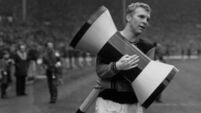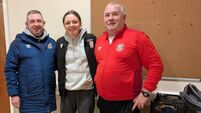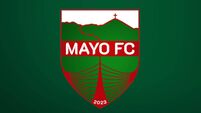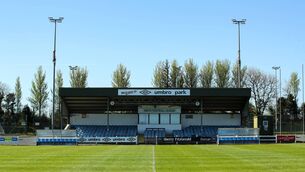What’s not to like about being hard to beat?
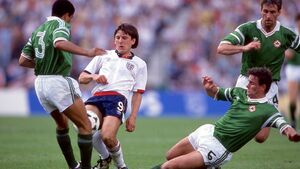
Chris Houghton, Kevin Moran and Mick McCarthy tackle Peter Beardsley during the Republic of Ireland's famous 1-0 victory over England in Stuttgart at the 1988 UEFA European Football Championship. Picture: INPHO/Billy Stickland
At least we gave it a go.
When bringing in Stephen Kenny as manager, the FAI exuded courage and ambition and for that, they must be given credit. And in fairness to the erstwhile Irish manager, he attempted to embed a more creative and entertaining style of football within the Irish set-up. The side kept the ball on the ground, played out from the back and, when the situation became somewhat hairy as poor results accumulated, Kenny persisted with his approach. And he, too, must be at the very least applauded for his stubborn perseverance to stick with his philosophy.
Alas, the grand transition plan failed miserably. Instead of becoming a flamboyant attacking system, the side have gone from being a difficult-to-beat side with little imagination to an easy-to-beat side with little imagination. And that has ultimately seen Irish football gradually slump into international obscurity, with the Irish public growing more indifferent to the national side as the months roll by.
At this stage, the Irish public have even become indifferent to the melodrama that is the search for the next permanent manager.
The last few weeks of Jonathan Hill's reign as CEO of the FAI saw a colourful selection of names linked with the role, most of them dropping out of the race almost as soon as they were named. From Hill appearing alongside Roberto Di Matteo at March's friendly against Switzerland to the sudden mention of Ole Gunnar Solskjaer as a candidate to the relatively unknown Swedish manager Janne Andersson who seemed only hours away from being announced at one stage, the entire process has had more plotlines feeding into it than a Game of Thrones episode. And then Gus Poyet, who recently finished up with Greece, seems to be emerging as favourite for the role on a fortnightly basis despite ruling himself out of the race.
If there was as much drama on the pitch, fans would be swarming back to the Aviva and all would be well within Irish football. For a few weeks it appeared as if a deal had been done with a secret candidate, leaving the rest of us to scamper around the village like locals trying to sniff out the local lottery winner. Alas, no new kitchens or conservatories were spotted and, as it turned out, the FAI were in fact still on the hunt, despite insinuating to the contrary.
Perhaps the time has now come to embrace what would've seemed unthinkable only a few months ago, to pull the emergency chord, to admit that there's only one viable option capable of bringing even a semblance of success. It's perhaps time to consider one of the no-nonsense and unimaginative personalities from the Premier League and Championship merry-go-round that are so often the subject of vilification.
These are the figures that have largely bare trophy cabinets. They don't bring attractive football. But they do tend do bring a sense of stability to clubs that find themselves in a tailspin. These are the managers that, to their disdain, are always overlooked for big jobs – and for good reason, too.
They're defensively-minded, with a stark lack of creativity within their respective approaches which regularly sees them perceived as artefacts from the past. Their stints never last long, but the Irish side may not need a long-term appointment. They just need a manager capable of arresting the decline.
The pay package may not be attractive enough to draw the gaze of Sean Dyche away from Everton, or to start pulling the pints of wine as we await Big Sam Allardyce's arrival, though there are plenty of managers of that ilk at Championship level and below. There are even some floating about that haven't had a job for a season or two.
There is an argument that surely the Irish team can attract more creative young managers at that level, too. But in its current state, with an academy system in desperate need of attention, Irish football is more likely to destroy the future prospects of a young ambitious manager than provide the platform from which they can go on to greater heights. Kenny came into the role, after all, having done fantastic work with the Irish under-21 team, and having led Dundalk to the group stages of the Europa League. Even for a man with decades of experience, the role sucked the momentum out of his career. There's no reason it can't happen to other ambitious managers.
Anyway, being hard to beat has been Ireland's identity since the Jack Charlton era. By trying to replace it we've been left with utter mediocrity and in a state that has left the national side spiralling through the rankings. And is being hard to beat all that bad?
There is, at times, a misconception that Jack Charlton played dull football, simply because he favoured direct football. However, that's an oversimplification of his philosophy. A short clip of his side taking on England at Euro 88 surfaced online again recently and offered an informative reminder of exactly what his teams were about. While his side was hoofing balls into the box, Irish players kept following the ball in and forcing England back towards their own goal. England were forced to boot the ball back to the Irish or attempt to dribble out of defence, which ultimately saw them dispossessed and the ball being put back in their box. In essence, they kept putting them under pressure. It was invigorating to watch.
Of course, if the FAI decide to go down the route of one of these defensively-minded managers the pitchforks will be out. They'll be accused of bringing the national team back to the dark days. But have there been darker days than the maelstrom of confusion and disarray in which the association now finds itself?
For David Courell, the Mayo man who has been foisted the poisoned chalice that is interim CEO of the FAI, and Director of Football Marc Canham, the unpopular decision may be the most sensible one at the current crossroads.
